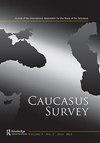阿布哈兹在俄罗斯-欧盟-格鲁吉亚三角中的地缘政治角色
IF 0.4
Q3 AREA STUDIES
引用次数: 0
摘要
事实上的国家经常被描绘成在执行外交政策方面没有什么权力。通过展示阿布哈兹如何隔离其受众,运用战略模糊性,扮演不同的地缘政治角色,本文对阿布哈兹的外交关系进行了更细致入微的描述。通过对阿布哈兹、格鲁吉亚、俄罗斯和欧盟(EU)的采访,作者呈现了阿布哈兹如何在俄罗斯-欧盟-格鲁吉亚三角关系中航行的历时性和多角度的描述。事实上的国家发挥地缘政治作用,以保持事实上的独立,减轻不承认的负面影响,并利用资源增加机动空间。通过对阿布哈兹最近采用的外交政策概念的分析,审查了两项关键战略- -受众隔离和战略模糊。分析显示,阿布哈兹对效仿欧盟成员国的兴趣下降,而维持现状和(在)稳定企业家等替代角色的崛起,而对该文件的反应表明,存在一种思想独立、国内有争议的外交政策。本文章由计算机程序翻译,如有差异,请以英文原文为准。
Abkhazia’s Geopolitical Roles in the Russia – European Union – Georgia Triangle
Abstract De facto states are often portrayed as possessing little agency in conducting foreign policy. By demonstrating how Abkhazia segregates its audiences, applies strategic ambiguity, and plays different geopolitical roles, this article presents a more nuanced account of Abkhazia’s foreign relations. Drawing on interviews conducted in Abkhazia, Georgia, Russia, and the European Union (EU), the author presents a diachronic and multi-sided account of how Abkhazia navigates the Russia – EU – Georgia triangle. De facto states play geopolitical roles to preserve de facto independence, mitigate the negative effects of non-recognition, and leverage resources to increase manoeuvring space. Two key strategies – audience segregation and strategic ambiguity – are examined through the analysis of Abkhazia’s recently adopted foreign policy concept. The analysis shows Abkhazia’s decreased interest in emulating EU member states and the rise of alternative roles of keeper of the status quo and (in)stability entrepreneur, while reactions to the document demonstrate the existence of an independent-minded and domestically contentious foreign policy.
求助全文
通过发布文献求助,成功后即可免费获取论文全文。
去求助
来源期刊

Caucasus Survey
Arts and Humanities-History
CiteScore
1.30
自引率
9.10%
发文量
4
期刊介绍:
Caucasus Survey is a new peer-reviewed, multidisciplinary and independent journal, concerned with the study of the Caucasus – the independent republics of Armenia, Azerbaijan and Georgia, de facto entities in the area and the North Caucasian republics and regions of the Russian Federation. Also covered are issues relating to the Republic of Kalmykia, Crimea, the Cossacks, Nogays, and Caucasian diasporas. Caucasus Survey aims to advance an area studies tradition in the humanities and social sciences about and from the Caucasus, connecting this tradition with core disciplinary concerns in the fields of history, political science, sociology, anthropology, cultural and religious studies, economics, political geography and demography, security, war and peace studies, and social psychology. Research enhancing understanding of the region’s conflicts and relations between the Russian Federation and the Caucasus, internationally and domestically with regard to the North Caucasus, features high in our concerns.
 求助内容:
求助内容: 应助结果提醒方式:
应助结果提醒方式:


